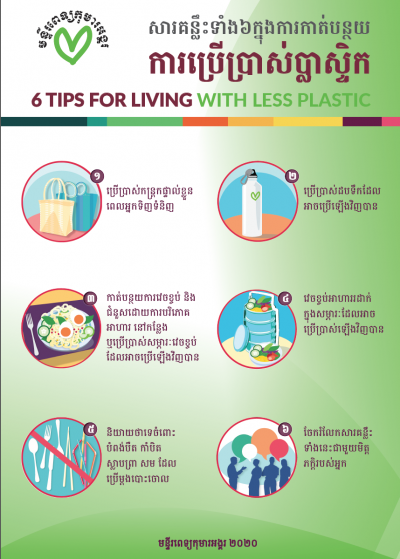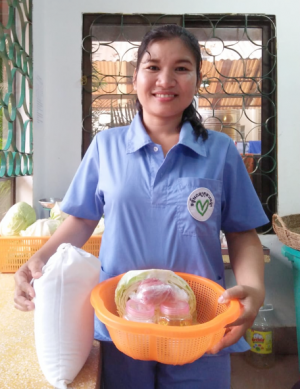Children’s Hospital Goes Green to Protect Children and the Planet
Angkor Hospital for Children was founded on the belief that every child has the right to a healthy life. Since 2016 AHC has been committed to making choices that are more environmentally sustainable to honour this belief and be a leader in the community.
“We still have a long way to go but we are making progress.” said Natasha Frost, English Teacher and project lead of the AHC Going Green Working Group.
“One of the first areas we addressed was the kitchen that provides food to patients and caretakers who are staying in the hospital. Caretakers were given rice, vegetables, eggs, oil, sugar and meat packaged in various sized plastic bags several times a week. We purchased reusable colanders and jars. It has also been possible to reuse empty containers from the pharmacy and glass jars from the community, after removing labels and washing them well. We had bags made for the rice from donations of sheets and tablecloths from hotels in Siem Reap. We utilised the services of the Sewing School at Life and Hope Association to make the bags as they are committed to breaking the cycle of poverty by providing compassionate care and access to education to the poorest and most vulnerable in Cambodia – especially children and disadvantaged young women.” said Natasha.
After 2 years the number of bags used in the kitchen has fallen by more than 30,000 units. Ken Vannak has worked hard to implement these changes, and tries to ensure that the reusable items are returned to kitchen after use. She has found that filling containers with oil or sugar is far easier than filling plastic bags. The containers are also far more user friendly for the caretakers and result in less spills in the kitchen area and lockers.
They’ve identified 7 key areas that have formed the basis for the environmental sustainability charter.
Waste Management: Work with staff, and suppliers to reduce waste output through best practice waste management, segregation and re‐cycling initiatives and promotion of waste minimization. To ensure the responsible disposal of any residual waste.
Sustainable Procurement: Seek to reduce consumption of materials and re‐use or re‐cycle where practical through sustainable procurement. Use a purchasing criteria which balances social, economic and environmental factors to select goods and services.
Event management: Work with hotels and other event suppliers to reduce consumption of single use plastics and promote waste minimisation.
Water Usage: Identify potential areas to reduce water consumption and promote efficient water use.
Carbon Management: To identify potential areas to reduce energy consumption
Staff & Community Involvement: Raise awareness among staff, and the local community to build partnerships and set joint objectives to improve the surrounding environment.
Construction & Refurbishment: Consider sustainability in all refurbishment and construction projects. To implement an efficiency programme to reduce energy.

The formation of the Environmental Sustainability Team has grouped together key representatives from around the hospital, in addition to the great efforts in the kitchen area, their dedication has seen the removal of disposable coffee cups at meetings, a change in the way they transport goods, portable kits of reusable drink bottles, cups and water when teams are going into the community to deliver services, removal of single-use plastics at lunch meetings, even sets to ensure that no plastic is needed for cakes that may be bought for birthdays or thank you parties for volunteers.
It’s really quite remarkable how much this hospital have been able to achieve thanks to some extremely dedicated individuals, an eagerness to apply learnings from workshops they’ve held with PFSEA and a desire to protect lives, not just those seeking medical treatment but by respecting their patients by providing the means for healthy environment into the future.
